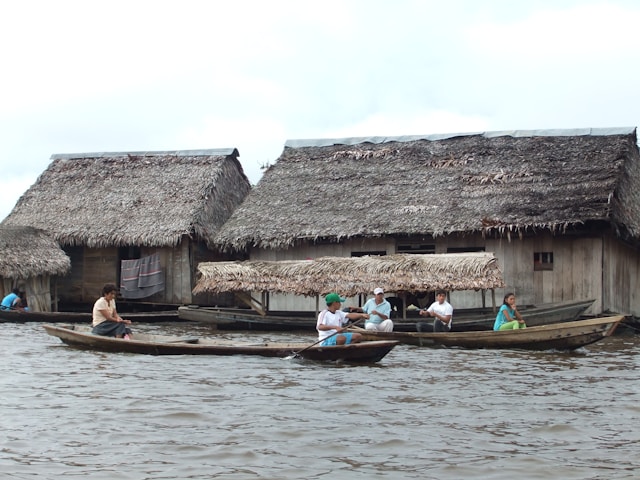Editor’s note: Campaigning for protecting wildlife and ecosystems is rarely successful if only fought in court. But in this case, a Peruvian court decided to give the river Maranon rights that would ensure its conservation and protection from oil spills. For this decision, the indigenous groups led by Kukama women have been fighting for their river for over three years. As with many people living on the land they depend on clean water and fertile land to feed their families. Now the court victory gives them the necessary legal foundation to keep on fighting for a life free from ecological disasters.
By Julia Conley/Commondreams
The decision “establishes a groundbreaking legal framework that acknowledges the inherent rights of natural entities,” said one campaigner.
After years of campaigning, an organization of Indigenous women in Peru’s Loreto province celebrated “a landmark decision” on Tuesday by a court in Nauta, which found that the Marañón River has “intrinsic value” and that its “inherent rights” must be recognized by the government.
The Mixed Court of Nauta ruled that specific rights of the river must be codified, including the right to exist, the right to ecological flow, the right of restoration, the right to be free of pollution, the right to exercise its essential functions with the ecosystem, and the right of representation.
Led by Kukama women, the Huaynakana Kamatahuara Kana Federation in the Parinari district of Loreto began its legal fight on behalf of the Marañón River in 2021, demanding that the state and federal governments protect the waterway from “constant oil spills.”
Petroperu’s Oleoducto Norperuano, or Norperuvian oil pipeline, caused more than 60 oil spills between 1997-2019, and the 28 communities represented by the federation are still recovering from a 2010 oil spill that sent 350 barrels of oil into the river near Saramuro port.
Oil spills not the only threat
Indigenous groups blocked the river in protest in September 2022 after another spill sent 2,500 barrels of crude oil into the Amazon, of which the Marañón is a main tributary.
The Marañón supplies drinking water directly to communities in Loreto, and is a vital habitat for fish that help sustain Indigenous communities.
“We do not live on money. We live from what we grow on our land and our fishing. We cannot live without fish,” Isabel Murayari, a board member of the federation, told the Earth Law Center, when the group filed its lawsuit in 2021.
The Kukama women also aimed to halt infrastructure projects including hydroelectric dams and the Amazon Waterway—recognized as environmental risks by the International Union for Conservation of Nature—and warned that illegal gold mining has left the Marañón with mercury contamination that must be remedied.
Martiza Quispe Mamani, an attorney representing the Huaynakana Kamatahuara Kana Federation, said the “historic ruling is an important achievement of the Kukama women.”
“The fact that the judge of the Nauta Court has declared the Marañón River as a subject of rights represents a significant and transcendental milestone for the protection not only of the Marañón River but also of all rivers contaminated by extractive activities,” said Mamani.
In addition to granting the river inherent rights, the court named the Indigenous group and the Peruvian government as “guardians, defenders, and representatives of the Marañón River and its tributaries.”
Precedent for global river conservation
Loreto’s regional government was ordered to take necessary steps with the National Water Authority to establish a water resource basin organization for the river. The court also required Petroperu to present an updated environmental management plan within six months.
Mariluz Canaquiri Murayari, president of the federation, said the group’s fight to protect the environment in the region “will continue.”
“It encourages us to fight to defend our territories and rivers, which is fundamental,” Murayari said of the ruling. “The recognition made in this decision has critical value. It is one more opportunity to keep fighting and claiming our rights. Our work is fundamental for Peru and the world: to protect our rivers, territories, our own lives, and all of humanity, and the living beings of Mother Nature.”
The women who led the legal action noted that courts in recent years have recognized rights for other waterways, including Colombia’s Atrato River, New Zealand’s Whanganui River, and Canada’s Magpie River.
Monti Aguirre, Latin America director of International Rivers, which supported the federation in its lawsuit, said the ruling “underscores the vital impact of community-led advocacy in safeguarding river ecosystems and sets a crucial precedent for river conservation efforts globally.”
“By recognizing the Marañón River as a subject of rights, this decision is significant not only in terms of environmental protection but also in advancing the rights of nature and the rights of rivers,” said Aguirre. “It establishes a groundbreaking legal framework that acknowledges the inherent rights of natural entities, paving the way for similar legal recognition and protection of rivers worldwide.”


Congrats on the victory! Environmental victories like this are few & far between, unfortunately, but having some is better than having none.